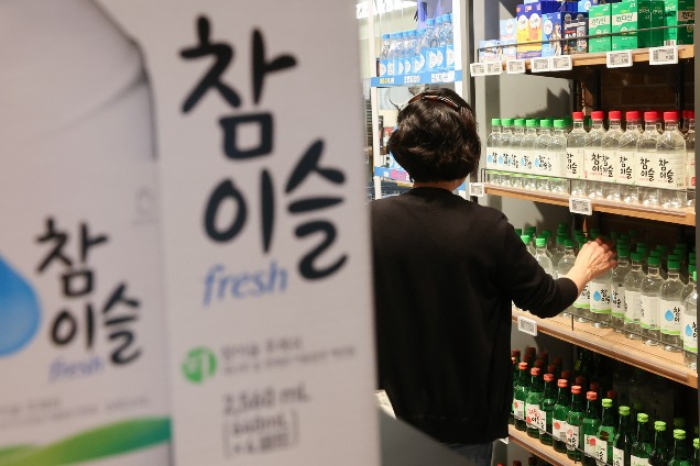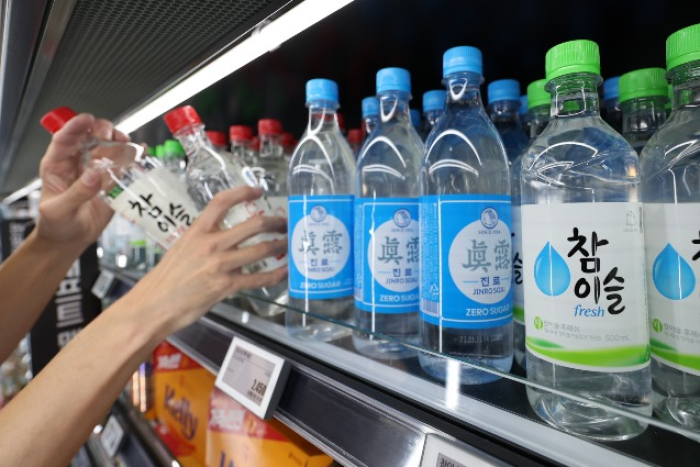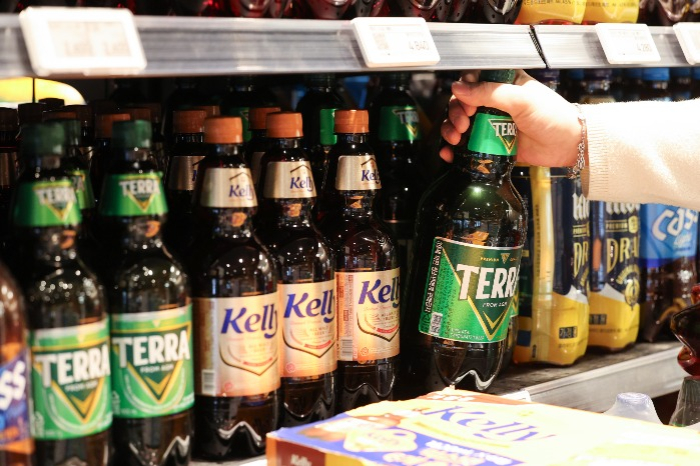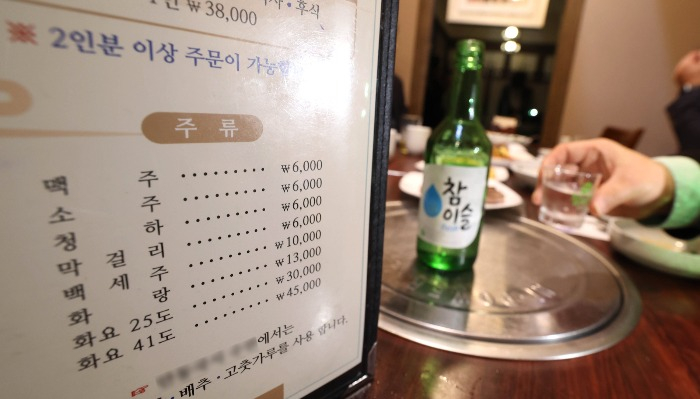Food & Beverage
Soju no longer working-class liquor
HiteJinro will raise the price of its distilled alcoholic beverage soju and beer products by 7% next month amid inflation
By Oct 31, 2023 (Gmt+09:00)
3
Min read
Most Read
LG Chem to sell water filter business to Glenwood PE for $692 million


Kyobo Life poised to buy Japan’s SBI Group-owned savings bank


KT&G eyes overseas M&A after rejecting activist fund's offer


StockX in merger talks with Naver’s online reseller Kream


Mirae Asset to be named Korea Post’s core real estate fund operator



HiteJinro Co., South Korea’s largest soju maker, will raise the price of its soju and beer products by about 7% next month to reflect higher costs from inflation, a move that could further fuel inflation in Asia’s fourth-largest economy.
The company announced on Tuesday that the factory price of Chamisul Fresh Soju and Chamisul Original Soju will go up 6.9% from their current price starting Nov. 9, while Jinro Soju’s price will climb 9.2%.
The price of its Terra and Kelly beers will also go up, by an average of 6.8%.
Under the new pricing table, the factory cost of a 360-milliliter bottle of Chamisul and Jinro sojus will increase to 1,247.7 won ($1) and 1,197.9 won, respectively.
The company attributed the latest price hike to a surge in the costs of key ingredients, raw materials and logistics. These include a 10.6% rise in ethanol and a 21.6% jump in bottle costs. Soju is made of ethanol, water and sweetener.
HiteJinro has, however, minimized the price hike this time to ease the burden on consumers, in line with the Korean government’s policy to stabilize inflation, the company official said.

GOVERNMENT’S PRESSURE ON PRICE HIKES
The Korean government has been putting pressure on the private sector to refrain from raising the prices of their products and services, to keep the country’s inflation in check.
In February, the soju industry planned to increase soju prices to reflect already higher raw materials and ingredient costs amid untamed inflation but postponed the plan at the government’s request.
The last time it raised soju prices was February last year.
But the Korean soju sector has no time to waste as soju producers have seen their earnings shrink amid rising costs. HiteJinro reported 50.6 billion won ($37.4 million) in operating profit in the first six months of this year, down 58% from the same period last year.
Its crosstown rival Oriental Brewery Co. already raised its popular beers’ factory price by 6.9% on Oct. 11, citing higher raw materials and logistics costs.

Lotte Chilsung Beverage, another major Korean soju producer, said it has no plan to jack up the price of Chum Churum Soju for now. But the latest price hike by the country’s No. 1 soju supplier with a 60% market share is expected to trigger a domino effect in price hikes by other soju brands, including Lotte Chilsung.
NOT CHEAP ANYMORE
A series of price hikes of Koreans’ favorite alcoholic beverages is expected to confront a consumer backlash at a time when the country’s headline inflation shows no sign of easing anytime soon.
The country’s consumer prices rose 3.7% in September versus a year ago, their fastest pace since April, according to Statistics Korea.
The Bank of Korea has warned that inflation may ease slower than expected amid growing global uncertainties. International oil and other commodities prices have been rallying again after the Israel-Hamas war broke out earlier this month.

In particular, given that soju is one of the country’s most-consumed alcoholic beverages thanks largely to its cheap price, consumer resistance to their price hike will likely be vehement.
Soju, a clear distilled alcoholic drink, is often called a working-class or national drink in Korea.
The traditional main ingredient of soju is rice or other fermented grains, but cheaper starches like sweet potato or tapioca are widely used to make highly distilled ethanol, soju's key ingredient, making soju an affordable spirit.
With the latest price hike, however, soju would not be considered a cheap alcoholic drink anymore.
In 2015, soju sold for 3,000 won to 4,000 won per bottle at restaurants. They are now priced at between 5,000 won to 6,000 won following an 85-won hike in February last year.
Following the latest price increase, soju prices at restaurants are projected to hit 7,000 won per bottle.
The higher soju price is forecast to increase overall dining-out costs, market experts say.
According to data from Korea’s National Tax Service released in June, national shipments of distilled soju amounted to 862,000 kiloliters in 2022, accounting for 26.3% of the nation's alcoholic beverage shipments and making it the second most-consumed alcoholic drink.
Beer commanded the largest proportion at 51.9%, with shipments of 1,698,000 kiloliters.
Write to Hun-Hyoung Ha at hhh@hankyung.com
Sookyung Seo edited this article.
More to Read
-
 Food & BeverageKorea steps up pressure on private sector to ease inflation
Food & BeverageKorea steps up pressure on private sector to ease inflationOct 20, 2023 (Gmt+09:00)
2 Min read -
 Central bankBOK chief says inflation may ease more slowly than expected
Central bankBOK chief says inflation may ease more slowly than expectedOct 19, 2023 (Gmt+09:00)
2 Min read -
 EconomyKorea expects inflation to ease from Oct after 5-month high
EconomyKorea expects inflation to ease from Oct after 5-month highOct 05, 2023 (Gmt+09:00)
2 Min read -
 Food & BeverageHiteJinro tops global distilled liquor sales for 22nd consecutive year
Food & BeverageHiteJinro tops global distilled liquor sales for 22nd consecutive yearJun 21, 2023 (Gmt+09:00)
1 Min read -
 Food & BeverageLotte’s soju team applauded as MZers bedazzled by sugar-free Saero
Food & BeverageLotte’s soju team applauded as MZers bedazzled by sugar-free SaeroApr 21, 2023 (Gmt+09:00)
2 Min read -

Comment 0
LOG IN


